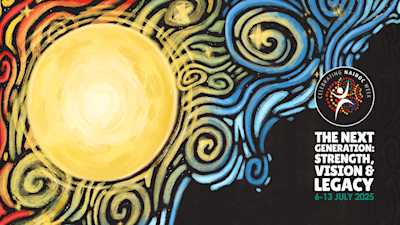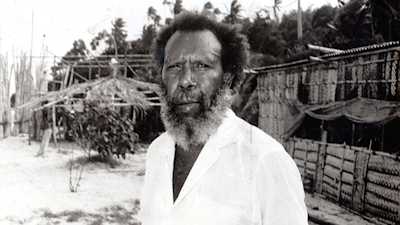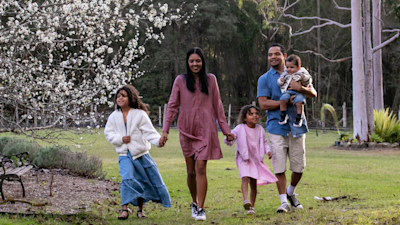How we talk about Reconciliation is just as important as the actions we take.

Image: An older Aboriginal gentleman wearing a hat speaking to a young women wearing grey.
The use of respectful language is crucial when referring to Aboriginal and Torres Strait Islander Peoples. This guide aims to promote respectful communication by providing information about the diverse identities and cultures within these communities.
Consider this guide with advice from your local community. This may help you prepare your written messages, such as your Vision for Reconciliation and Acknowledgement of Country, as well as in everyday communications.
It is important to acknowledge that there is no singular Aboriginal or Torres Strait Islander identity, as they encompass a rich tapestry of cultures and histories.
Aboriginal or Torres Strait Islander Peoples are the world’s oldest surviving culture; cultures that continue to be expressed in dynamic and contemporary ways. Cultures that should be respected.
It is essential to recognise and respect that Aboriginal and Torres Strait Islander Peoples comprise of many different nations, language groups, and communities, each with distinct cultural practices, languages, and histories. By acknowledging this we can avoid generalisations and stereotypes.
‘Aboriginal’ is a broad term that groups nations and custodians of mainland Australia and Tasmania, Fraser Island, Palm Island, Mornington Island, Groote Eylandt, Bathurst and Melville Islands.
‘Torres Strait Islander’ is a broad term used for peoples of 18 islands and 2 Northern Peninsula Area (NPA) communities - Bamaga and Seisia. The islands are scattered over a geographic area of 48,000 square kilometres from the tip of Cape York, north towards the borders of Papua New Guinea and Indonesia. Find more about Torres Strait communities here.

Image: A map of Australia with language areas highlighted in different colours.
You can find an interactive version of the AIATSIS map here.
Preferred Terminology
When referring to Aboriginal and Torres Strait Islander Peoples, it is recommended to use specific terminology that acknowledges their identity and respects their preferences. Terms like "Aboriginal and Torres Strait Islander Peoples" or "Aboriginal and Torres Strait Islander communities" are inclusive and should be used instead of generic terms like "Indigenous" and definitely not abbreviations like "ATSI." Some groups also prefer you do not use the term First Nations, as this is more often used by Canadian and North American people.
Language Usage
Inclusive language is using words, phrases, or tones that are free from prejudiced, stereotyped, or discriminatory views of a particular individual or group of people.
Be conscious that Aboriginal and Torres Strait Islander Peoples are diverse in culture and identities across Australia, you should always seek advice from Aboriginal and Torres Strait Islander Peoples regarding preferences and protocols around terminology.
Cultural Context
Understanding the cultural context is essential when using inclusive language. Aboriginal and Torres Strait Islander Peoples have deep cultural connections to their lands, languages, and traditions. Taking the time to learn about and appreciate these contexts can help create meaningful and respectful communication.
First Languages Australia is a great resource to learn more.

Image: Life Without Barriers staff at the National Sorry Day event in Queensland.
Colonial History
Acknowledging the impacts of colonisation and the ongoing struggles faced by Aboriginal and Torres Strait Islander Peoples is important. When discussing this history, it is crucial to be sensitive and avoid placing blame or perpetuating harmful narratives. Focus on fostering understanding, empathy, and support.
Self-Determination
Respecting and understanding self-determination is vital. Self-determination is an ongoing process of choice to ensure that Aboriginal and Torres Strait Islander Peoples and their communities are able to meet their social, cultural and economic needs and have control and autonomy over their lives.
At Life Without Barriers, we support self-determination for Aboriginal and Torres Strait Islander Peoples and communities. We acknowledge and work to build the capacity of individuals, families and communities to identify and put in place their own solutions.
Avoid making assumptions or questioning someone's identity based on appearance or apparent personal background, as you should for any person.
Working with Communities
Collaborating with Aboriginal and Torres Strait Islander communities is essential to ensure accurate and respectful representation. Engaging in meaningful consultation and seeking permission before using cultural knowledge or imagery demonstrates respect for Aboriginal and Torres Strait Islander protocols and practices.
A Welcome to Country is not the same as an Acknowledgement of Country
Only Traditional Owners/Custodians of the land on which the event takes place can deliver a Welcome to Country. It is best practice that a Welcome to Country is conducted at official events, major public forums and functions.
If a Traditional Owner/Custodian is not available to do a Welcome to Country, an Acknowledgement of Country can be delivered instead. The person who provides this is to pay respect to the Traditional Owners and Custodians of the Country where an event/meeting is being held.
An Acknowledgement of Country should be performed at the beginning of a meeting or event.
You can learn how to deliver an Acknowledgement of Country here.
Deceased persons
In some Aboriginal and Torres Strait Islander communities, seeing images of deceased persons in photographs, film and books or hearing them in recordings may cause sadness or distress and in some cases, offend against strongly held cultural prohibitions.
If you are sharing an image, it must come with a warning similar to the following:
‘Aboriginal and Torres Strait Islander peoples are informed that this website may contain images, voices or names of people who have since passed away.’
Ongoing Learning
Maintaining a commitment to ongoing learning is crucial in understanding and promoting inclusive language. Actively seeking out resources, participating in cultural awareness and cultural immersion programs, and engaging in respectful discussions with Aboriginal and Torres Strait Islander Peoples can help enhance understanding and foster positive relationships.
By adopting inclusive language and respecting the diverse identities and cultures within Aboriginal and Torres Strait Islander communities, we can contribute to a more respectful and equitable society. Embracing this approach is a significant step towards Reconciliation and Self-Determination, and fostering positive relationships with the Aboriginal and Torres Strait Islander Peoples of Australia.

Image: A man and woman are holding a toddler. They are all looking at the camera.
For further education, we suggest visiting:
An important note: While this guide outlines good practice terminology, it is important that we use language preferred by an individual when we are referring to their identity, experience, or perspective. Always ask for people’s preferences about what they want to be called or how they want to identify. It is usually more respectful to be specific.


